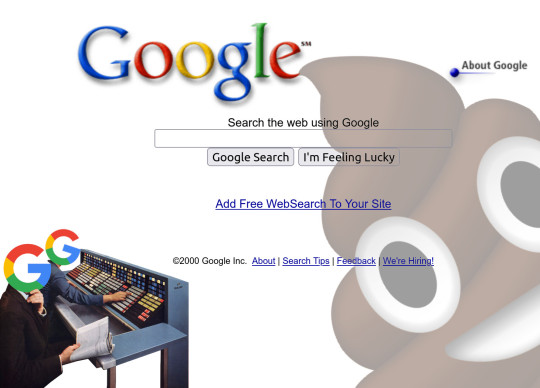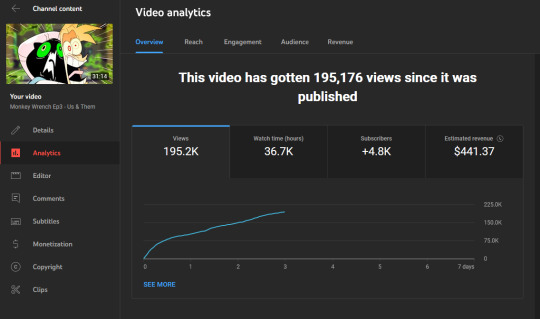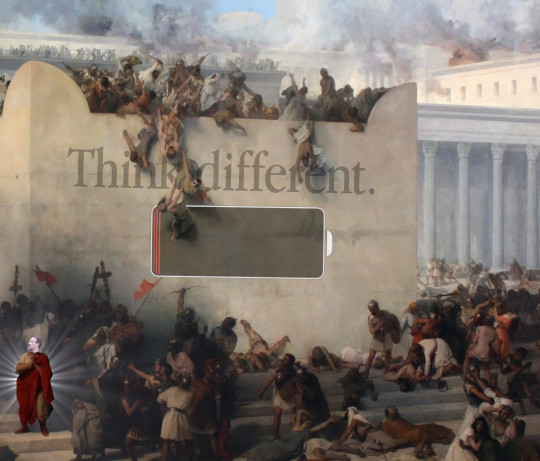#Transparency
Text

Heavenly
25 notes
·
View notes
Text

ashley scarrott
27 notes
·
View notes
Text
5K notes
·
View notes
Text
Google’s enshittification memos

[Note, 9 October 2023: Google disputes the veracity of this claim, but has declined to provide the exhibits and testimony to support its claims. Read more about this here.]

When I think about how the old, good internet turned into the enshitternet, I imagine a series of small compromises, each seemingly reasonable at the time, each contributing to a cultural norm of making good things worse, and worse, and worse.
Think about Unity President Marc Whitten's nonpology for his company's disastrous rug-pull, in which they declared that everyone who had paid good money to use their tool to make a game would have to keep paying, every time someone downloaded that game:
The most fundamental thing that we’re trying to do is we’re building a sustainable business for Unity. And for us, that means that we do need to have a model that includes some sort of balancing change, including shared success.
https://www.wired.com/story/unity-walks-back-policies-lost-trust/
"Shared success" is code for, "If you use our tool to make money, we should make money too." This is bullshit. It's like saying, "We just want to find a way to share the success of the painters who use our brushes, so every time you sell a painting, we want to tax that sale." Or "Every time you sell a house, the company that made the hammer gets to wet its beak."
And note that they're not talking about shared risk here – no one at Unity is saying, "If you try to make a game with our tools and you lose a million bucks, we're on the hook for ten percent of your losses." This isn't partnership, it's extortion.
How did a company like Unity – which became a market leader by making a tool that understood the needs of game developers and filled them – turn into a protection racket? One bad decision at a time. One rationalization and then another. Slowly, and then all at once.
When I think about this enshittification curve, I often think of Google, a company that had its users' backs for years, which created a genuinely innovative search engine that worked so well it seemed like *magic, a company whose employees often had their pick of jobs, but chose the "don't be evil" gig because that mattered to them.
People make fun of that "don't be evil" motto, but if your key employees took the gig because they didn't want to be evil, and then you ask them to be evil, they might just quit. Hell, they might make a stink on the way out the door, too:
https://theintercept.com/2018/09/13/google-china-search-engine-employee-resigns/
Google is a company whose founders started out by publishing a scientific paper describing their search methodology, in which they said, "Oh, and by the way, ads will inevitably turn your search engine into a pile of shit, so we're gonna stay the fuck away from them":
http://infolab.stanford.edu/pub/papers/google.pdf
Those same founders retained a controlling interest in the company after it went IPO, explaining to investors that they were going to run the business without having their elbows jostled by shortsighted Wall Street assholes, so they could keep it from turning into a pile of shit:
https://abc.xyz/investor/founders-letters/ipo-letter/
And yet, it's turned into a pile of shit. Google search is so bad you might as well ask Jeeves. The company's big plan to fix it? Replace links to webpages with florid paragraphs of chatbot nonsense filled with a supremely confident lies:
https://pluralistic.net/2023/05/14/googles-ai-hype-circle/
How did the company get this bad? In part, this is the "curse of bigness." The company can't grow by attracting new users. When you have 90%+ of the market, there are no new customers to sign up. Hypothetically, they could grow by going into new lines of business, but Google is incapable of making a successful product in-house and also kills most of the products it buys from other, more innovative companies:
https://killedbygoogle.com/
Theoretically, the company could pursue new lines of business in-house, and indeed, the current leaders of companies like Amazon, Microsoft and Apple are all execs who figured out how to get the whole company to do something new, and were elevated to the CEO's office, making each one a billionaire and sealing their place in history.
It is for this very reason that any exec at a large firm who tries to make a business-wide improvement gets immediately and repeatedly knifed by all their colleagues, who correctly reason that if someone else becomes CEO, then they won't become CEO. Machiavelli was an optimist:
https://pluralistic.net/2023/07/28/microincentives-and-enshittification/
With no growth from new customers, and no growth from new businesses, "growth" has to come from squeezing workers (say, laying off 12,000 engineers after a stock buyback that would have paid their salaries for the next 27 years), or business customers (say, by colluding with Facebook to rig the ad market with the Jedi Blue conspiracy), or end-users.
Now, in theory, we might never know exactly what led to the enshittification of Google. In theory, all of compromises, debates and plots could be lost to history. But tech is not an oral culture, it's a written one, and techies write everything down and nothing is ever truly deleted.
Time and again, Big Tech tells on itself. Think of FTX's main conspirators all hanging out in a group chat called "Wirefraud." Amazon naming its program targeting weak, small publishers the "Gazelle Project" ("approach these small publishers the way a cheetah would pursue a sickly gazelle”). Amazon documenting the fact that users were unknowingly signing up for Prime and getting pissed; then figuring out how to reduce accidental signups, then deciding not to do it because it liked the money too much. Think of Zuck emailing his CFO in the middle of the night to defend his outsized offer to buy Instagram on the basis that users like Insta better and Facebook couldn't compete with them on quality.
It's like every Big Tech schemer has a folder on their desktop called "Mens Rea" filled with files like "Copy_of_Premeditated_Murder.docx":
https://doctorow.medium.com/big-tech-cant-stop-telling-on-itself-f7f0eb6d215a?sk=351f8a54ab8e02d7340620e5eec5024d
Right now, Google's on trial for its sins against antitrust law. It's a hard case to make. To secure a win, the prosecutors at the DoJ Antitrust Division are going to have to prove what was going on in Google execs' minds when the took the actions that led to the company's dominance. They're going to have to show that the company deliberately undertook to harm its users and customers.
Of course, it helps that Google put it all in writing.
Last week, there was a huge kerfuffile over the DoJ's practice of posting its exhibits from the trial to a website each night. This is a totally normal thing to do – a practice that dates back to the Microsoft antitrust trial. But Google pitched a tantrum over this and said that the docs the DoJ were posting would be turned into "clickbait." Which is another way of saying, "the public would find these documents very interesting, and they would be damning to us and our case":
https://www.bigtechontrial.com/p/secrecy-is-systemic
After initially deferring to Google, Judge Amit Mehta finally gave the Justice Department the greenlight to post the document. It's up. It's wild:
https://www.justice.gov/d9/2023-09/416692.pdf
The document is described as "notes for a course on communication" that Google VP for Finance Michael Roszak prepared. Roszak says he can't remember whether he ever gave the presentation, but insists that the remit for the course required him to tell students "things I didn't believe," and that's why the document is "full of hyperbole and exaggeration."
OK.
But here's what the document says: "search advertising is one of the world's greatest business models ever created…illicit businesses (cigarettes or drugs) could rival these economics…[W]e can mostly ignore the demand side…(users and queries) and only focus on the supply side of advertisers, ad formats and sales."
It goes on to say that this might be changing, and proposes a way to balance the interests of the search and ads teams, which are at odds, with search worrying that ads are pushing them to produce "unnatural search experiences to chase revenue."
"Unnatural search experiences to chase revenue" is a thinly veiled euphemism for the prophetic warnings in that 1998 Pagerank paper: "The goals of the advertising business model do not always correspond to providing quality search to users." Or, more plainly, "ads will turn our search engine into a pile of shit."
And, as Roszak writes, Google is "able to ignore one of the fundamental laws of economics…supply and demand." That is, the company has become so dominant and cemented its position so thoroughly as the default search engine across every platforms and system that even if it makes its search terrible to goose revenues, users won't leave. As Lily Tomlin put it on SNL: "We don't have to care, we're the phone company."
In the enshittification cycle, companies first lure in users with surpluses – like providing the best search results rather than the most profitable ones – with an eye to locking them in. In Google's case, that lock-in has multiple facets, but the big one is spending billions of dollars – enough to buy a whole Twitter, every single year – to be the default search everywhere.
Google doesn't buy its way to dominance because it has the very best search results and it wants to shield you from inferior competitors. The economically rational case for buying default position is that preventing competition is more profitable than succeeding by outperforming competitors. The best reason to buy the default everywhere is that it lets you lower quality without losing business. You can "ignore the demand side, and only focus on advertisers."
For a lot of people, the analysis stops here. "If you're not paying for the product, you're the product." Google locks in users and sells them to advertisers, who are their co-conspirators in a scheme to screw the rest of us.
But that's not right. For one thing, paying for a product doesn't mean you won't be the product. Apple charges a thousand bucks for an iPhone and then nonconsensually spies on every iOS user in order to target ads to them (and lies about it):
https://pluralistic.net/2022/11/14/luxury-surveillance/#liar-liar
John Deere charges six figures for its tractors, then runs a grift that blocks farmers from fixing their own machines, and then uses their control over repair to silence farmers who complain about it:
https://pluralistic.net/2022/05/31/dealers-choice/#be-a-shame-if-something-were-to-happen-to-it
Fair treatment from a corporation isn't a loyalty program that you earn by through sufficient spending. Companies that can sell you out, will sell you out, and then cry victim, insisting that they were only doing their fiduciary duty for their sacred shareholders. Companies are disciplined by fear of competition, regulation or – in the case of tech platforms – customers seizing the means of computation and installing ad-blockers, alternative clients, multiprotocol readers, etc:
https://doctorow.medium.com/an-audacious-plan-to-halt-the-internets-enshittification-and-throw-it-into-reverse-3cc01e7e4604?sk=85b3f5f7d051804521c3411711f0b554
Which is where the next stage of enshittification comes in: when the platform withdraws the surplus it had allocated to lure in – and then lock in – business customers (like advertisers) and reallocate it to the platform's shareholders.
For Google, there are several rackets that let it screw over advertisers as well as searchers (the advertisers are paying for the product, and they're also the product). Some of those rackets are well-known, like Jedi Blue, the market-rigging conspiracy that Google and Facebook colluded on:
https://en.wikipedia.org/wiki/Jedi_Blue
But thanks to the antitrust trial, we're learning about more of these. Megan Gray – ex-FTC, ex-DuckDuckGo – was in the courtroom last week when evidence was presented on Google execs' panic over a decline in "ad generating searches" and the sleazy gimmick they came up with to address it: manipulating the "semantic matching" on user queries:
https://www.wired.com/story/google-antitrust-lawsuit-search-results/
When you send a query to Google, it expands that query with terms that are similar – for example, if you search on "Weds" it might also search for "Wednesday." In the slides shown in the Google trial, we learned about another kind of semantic matching that Google performed, this one intended to turn your search results into "a twisted shopping mall you can’t escape."
Here's how that worked: when you ran a query like "children's clothing," Google secretly appended the brand name of a kids' clothing manufacturer to the query. This, in turn, triggered a ton of ads – because rival brands will have bought ads against their competitors' name (like Pepsi buying ads that are shown over queries for Coke).
Here we see surpluses being taken away from both end-users and business customers – that is, searchers and advertisers. For searchers, it doesn't matter how much you refine your query, you're still going to get crummy search results because there's an unkillable, hidden search term stuck to your query, like a piece of shit that Google keeps sticking to the sole of your shoe.
But for advertisers, this is also a scam. They're paying to be matched to users who search on a brand name, and you didn't search on that brand name. It's especially bad for the company whose name has been appended to your search, because Google has a protection racket where the company that matches your search has to pay extra in order to show up overtop of rivals who are worse matches. Both the matching company and those rivals have given Google a credit-card that Google gets to bill every time a user searches on the company's name, and Google is just running fraudulent charges through those cards.
And, of course, Google put this in writing. I mean, of course they did. As we learned from the documentary The Incredibles, supervillains can't stop themselves from monologuing, and in big, sprawling monopolists, these monologues have to transmitted electronically – and often indelibly – to far-flung co-cabalists.
As Gray points out, this is an incredibly blunt enshittification technique: "it hadn’t even occurred to me that Google just flat out deletes queries and replaces them with ones that monetize better." We don't know how long Google did this for or how frequently this bait-and-switch was deployed.
But if this is a blunt way of Google smashing its fist down on the scales that balance search quality against ad revenues, there's plenty of subtler ways the company could sneak a thumb on there. A Google exec at the trial rhapsodized about his company's "contract with the user" to deliver an "honest results policy," but given how bad Google search is these days, we're left to either believe he's lying or that Google sucks at search.
The paper trail offers a tantalizing look at how a company went from doing something that was so good it felt like a magic trick to being "able to ignore one of the fundamental laws of economics…supply and demand," able to "ignore the demand side…(users and queries) and only focus on the supply side of advertisers."
What's more, this is a system where everyone loses (except for Google): this isn't a grift run by Google and advertisers on users – it's a grift Google runs on everyone.

If you'd like an essay-formatted version of this post to read or share, here's a link to it on pluralistic.net, my surveillance-free, ad-free, tracker-free blog:
https://pluralistic.net/2023/10/03/not-feeling-lucky/#fundamental-laws-of-economics


My next novel is The Lost Cause, a hopeful novel of the climate emergency. Amazon won't sell the audiobook, so I made my own and I'm pre-selling it on Kickstarter!
#pluralistic#enshittification#semantic matching#google#antitrust#trustbusting#transparency#fatfingers#serp#the algorithm#telling on yourself
6K notes
·
View notes
Text

528 notes
·
View notes
Text
Watch for the continued response from Democrats, mainstream media and globalists on Tucker Carlson's interview of Russian President Putin. See what they say and how they say it. This will tell everything.
They do not want the West to know, they do not want transparency.
#russia#putin#tucker carlson#transparency#mainstream media#americans first#america first#repost#america#democrats#trump 2024#nato#landscape#nature#art#gif#lol#diy#biden is corrupt#president trump#trump#love#Europe#Ukraine#corruption
284 notes
·
View notes
Text

Madison Kate
785 notes
·
View notes
Text

RIKEN YAMAMOTO
HIROSHIMA NISHI FIRE STATION, 2000
Hiroshima, Japan
Image © Tomio Ohashi
#riken yamamoto#pritzker prize#architecture#design#architect#art#designer#archdaily#artwork#photography#juliaknz#form#japanese architecture#urban#buildings#architectural space#hiroshima#japanese houses#material#transparency
160 notes
·
View notes
Text

Maria Stinger
Faded Color Transparency
by Bunny Yeager
c.1950's
159 notes
·
View notes
Text


1K notes
·
View notes
Text

So wonderful
702 notes
·
View notes
Text

bryce chapman by corey myers
390 notes
·
View notes
Note
Question; if it would be a lot cheaper and a lot kinder stress-wise, why not go forward with the animatic style, no matter the results at the end of the month?
I am rooting for you as a long time follower, and a fan of the series, but fully sympathetic of the kinds of physical, mental, and financial strains a series like this can take on someone and their team. I selfishly would LOVE fully animated, but unless you're thriving doing it, I'd rather you take the easier road, y'know?
Your OCT days let me know for SURE even the lower animations would be a huge hit, and the story is extremely compelling. I feel like even if it was a lower standard of animation the fandom, and income, would still continue to grow.
But! I have never run a team, I'm just curious to the thought processes as to what is making it an either/or situation for you and team for which road to take depending on the success.
Follow up question;
Would you happen to have a ballpark idea of how many views on youtube you'd need?
We'll have to see how things look at the end of January.
Some quick transparency; right now this is how much ep 3 has made in terms of ad rev on YT with it coming close to 200k views (yes this is against YT TOS but ash and I are all about being as transparent as possible for stuff like this)

Currently it's looking like $225 average per 100k views. If we want to break even with the ep's overall cost ($54k) with ad rev we'd need somewhere in the ball park of 25,000,000 views.
Which isn't possible for us lol
This is why merch sales and Patreon support, especially nowadays, is SUPER important for indie projects.
Again, we'll see what the end of January looks like for us, but right now we are heavily leaning into a hybrid of animatic and animation.
I just know it's gonna annoy a lot of people with the switch.
182 notes
·
View notes
Text
When Facebook came for your battery, feudal security failed

When George Hayward was working as a Facebook data-scientist, his bosses ordered him to run a “negative test,” updating Facebook Messenger to deliberately drain users’ batteries, in order to determine how power-hungry various parts of the apps were. Hayward refused, and Facebook fired him, and he sued:
https://nypost.com/2023/01/28/facebook-fires-worker-who-refused-to-do-negative-testing-awsuit/
If you’d like an essay-formatted version of this post to read or share, here’s a link to it on pluralistic.net, my surveillance-free, ad-free, tracker-free blog:
https://pluralistic.net/2023/02/05/battery-vampire/#drained
Hayward balked because he knew that among the 1.3 billion people who use Messenger, some would be placed in harm’s way if Facebook deliberately drained their batteries — physically stranded, unable to communicate with loved ones experiencing emergencies, or locked out of their identification, payment method, and all the other functions filled by mobile phones.
As Hayward told Kathianne Boniello at the New York Post, “Any data scientist worth his or her salt will know, ‘Don’t hurt people…’ I refused to do this test. It turns out if you tell your boss, ‘No, that’s illegal,’ it doesn’t go over very well.”
Negative testing is standard practice at Facebook, and Hayward was given a document called “How to run thoughtful negative tests” regarding which he said, “I have never seen a more horrible document in my career.”
We don’t know much else, because Hayward’s employment contract included a non-negotiable binding arbitration waiver, which means that he surrendered his right to seek legal redress from his former employer. Instead, his claim will be heard by an arbitrator — that is, a fake corporate judge who is paid by Facebook to decide if Facebook was wrong. Even if he finds in Hayward’s favor — something that arbitrators do far less frequently than real judges do — the judgment, and all the information that led up to it, will be confidential, meaning we won’t get to find out more:
https://pluralistic.net/2022/06/12/hot-coffee/#mcgeico
One significant element of this story is that the malicious code was inserted into Facebook’s app. Apps, we’re told, are more secure than real software. Under the “curated computing” model, you forfeit your right to decide what programs run on your devices, and the manufacturer keeps you safe. But in practice, apps are just software, only worse:
https://pluralistic.net/2022/06/23/peek-a-boo/#attack-helicopter-parenting
Apps are part what Bruce Schneier calls “feudal security.” In this model, we defend ourselves against the bandits who roam the internet by moving into a warlord’s fortress. So long as we do what the warlord tells us to do, his hired mercenaries will keep us safe from the bandits:
https://locusmag.com/2021/01/cory-doctorow-neofeudalism-and-the-digital-manor/
But in practice, the mercenaries aren’t all that good at their jobs. They let all kinds of badware into the fortress, like the “pig butchering” apps that snuck into the two major mobile app stores:
https://arstechnica.com/information-technology/2023/02/pig-butchering-scam-apps-sneak-into-apples-app-store-and-google-play/
It’s not merely that the app stores’ masters make mistakes — it’s that when they screw up, we have no recourse. You can’t switch to an app store that pays closer attention, or that lets you install low-level software that monitors and overrides the apps you download.
Indeed, Apple’s Developer Agreement bans apps that violate other services’ terms of service, and they’ve blocked apps like OG App that block Facebook’s surveillance and other enshittification measures, siding with Facebook against Apple device owners who assert the right to control how they interact with the company:
https://pluralistic.net/2022/12/10/e2e/#the-censors-pen
When a company insists that you must be rendered helpless as a condition of protecting you, it sets itself up for ghastly failures. Apple’s decision to prevent every one of its Chinese users from overriding its decisions led inevitably and foreseeably to the Chinese government ordering Apple to spy on those users:
https://pluralistic.net/2022/11/11/foreseeable-consequences/#airdropped
Apple isn’t shy about thwarting Facebook’s business plans, but Apple uses that power selectively — they blocked Facebook from spying on Iphone users (yay!) and Apple covertly spied on its customers in exactly the same way as Facebook, for exactly the same purpose, and lied about it:
https://pluralistic.net/2022/11/14/luxury-surveillance/#liar-liar
The ultimately, irresolvable problem of Feudal Security is that the warlord’s mercenaries will protect you against anyone — except the warlord who pays them. When Apple or Google or Facebook decides to attack its users, the company’s security experts will bend their efforts to preventing those users from defending themselves, turning the fortress into a prison:
https://pluralistic.net/2022/10/20/benevolent-dictators/#felony-contempt-of-business-model
Feudal security leaves us at the mercy of giant corporations — fallible and just as vulnerable to temptation as any of us. Both binding arbitration and feudal security assume that the benevolent dictator will always be benevolent, and never make a mistake. Time and again, these assumptions are proven to be nonsense.
Image:
Anthony Quintano (modified)
https://commons.wikimedia.org/wiki/File:Mark_Zuckerberg_F8_2018_Keynote_%2841118890174%29.jpg
CC BY 2.0:
https://creativecommons.org/licenses/by/2.0/deed.en
[Image ID: A painting depicting the Roman sacking of Jerusalem. The Roman leader's head has been replaced with Mark Zuckerberg's head. The wall has Apple's 'Think Different' wordmark and an Ios 'low battery' icon.]
Next week (Feb 8-17), I'll be in Australia, touring my book *Chokepoint Capitalism* with my co-author, Rebecca Giblin. We'll be in Brisbane on Feb 8, and then we're doing a remote event for NZ on Feb 9. Next is Melbourne, Sydney and Canberra. I hope to see you!
https://chokepointcapitalism.com/
#pluralistic#manorial security#feudal security#apple#mobile#apps#security through obscurity#binding arbitration#arbitration waivers#transparency#danegeld#surveillance lag
4K notes
·
View notes
Photo

[ Damian Wayne as Batman in DCeased: War of the Undead Gods (2022) #8 ]
#Damian Wayne#Batman! Damian#DCeased: War of the Undead Gods (2022)#He looks like a mini-Bruce I can't#Pretty Eyes#DCeased#Transparent#Transparency
500 notes
·
View notes
Photo

Kees Goudzwaard / Bright Red – Transparency / Painting / 2021
225 notes
·
View notes